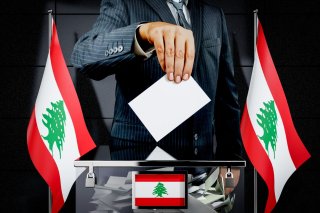Will Lebanon’s Parliament Finally Elect a New President?
Will the seven-month-long presidential paralysis finally be broken?
Lebanon’s parliamentary rival camps are set to convene a new session on June 14 to try once again to elect a new president. This would be the twelfth attempt to find someone who can forge a consensus among all the parties who are divided into different factions. Parliamentary Speaker Nabih Berri declared he would open the chamber’s doors for a session, provided there were two serious candidates. The names that will receive the most votes are Jihad Azour and Suleiman Frangieh.
The atmosphere feels like a high-stakes showdown between two diametrically opposing visions for Lebanon. In some way, it is. The crucial question is: will the seven-month-long presidential paralysis finally be broken?
It is difficult to say. But Azour’s chances of entering Baabda (the presidential residence) are higher than those who came before him. One example is Michel Moawad, who had the support of multiple parties like the Lebanese Forces (LF), Kataeb, and “Change” members of Parliament. Moawad, who is also a member of Parliament, held a press conference on June 4 announcing his withdrawal and endorsement of Azour after momentum began building behind him.
“I decided to contribute to reaching this intersection that led to the nomination of Jihad Azour, and we shall relentlessly continue our battle,” he said.
For Moawad, a viable rescue plan to bring Lebanon out of its current economic problems had taken precedence over his political ambitions.
Nevertheless, his campaign for the presidency had hit a wall. The support Moawad rallied behind him was not enough to meet the threshold to become former President Michel Aoun’s successor. The negotiations began to proceed in search of a compromise. Azour is not new in Lebanese politics. He has a history of serving in government as finance minister (2005-2008), but also as a senior International Monetary Fund (IMF) official. The cabinet he served in was led by Prime Minister Fouad Siniora. Added to his political experience, the reputation Azour obtained as a competent global finance expert strengthened the argument that he can lead Lebanon out of its current economic crisis.
Mark Daou, a member of the Parliament of the Taqaddom Party, spoke to The National Interest about why he is casting his ballot for Azour.
“It’s his financial prowess. He knows the international community and can open doors for Lebanon. He has spent time in Lebanon’s archaic system and has broad experience through his IMF days in dealing with crisis ridden states.”
Daou made another point by addressing the fact that he is not Suleiman Frangieh—Hezbollah’s candidate. Hezbollah publicly endorsed the Christian Marada Movement leader early on. Frangieh, who hails from the northern region of Zgharta (same as Moawad), has not received any support from Christian parties. The presidential seat is reserved for a Maronite Christian in Lebanon’s confessional system. So far, the opposition in Parliament is holding the line on their rejection of Frangieh’s ascendency. In fact, it has grown to attract unexpected support.
In an unexpected convergence, the Free Patriotic Movement (FPM) and its leader, Gebran Bassil, announced their intention to vote for Azour. From the beginning of the presidential race, the FPM and Hezbollah (traditionally allies) did not agree on a candidate for the presidency. Hezbollah made it clear that its candidate was Frangieh and has not shown signals of wavering on its position.
This caused a falling out between the two parties who are now at cross purposes on this issue. Bassil has said to the international press that although he has joined with the opposition in supporting Azour, his position is not “entrenched” and the possibility to find other names remains open.
“If we support a name, it doesn't mean we refuse all others. We are always available and ready for dialogue to agree on a consensual name.”
Others have taken a more nuanced view on why they have chosen to rally their support around Azour. One source from the Lebanese Forces told The National Interest what the reasons are for selecting Azour after many months of standing by Moawad.
“First, we did not choose to support Mr. Jihad Azour, as he is not our candidate, nor the candidate of any party. Yet, there was a convergence of several groups over his name.”
Lebanon’s complicated system makes it almost impossible for one side to push their candidate of choice without a political deal. This has held Lebanon back from making substantial progress on reforms, even despite opportunities to save the country.
The LF also believes that Azour’s history in the financial sector both in government and abroad gives him the necessary legitimacy to start the IMF bailout plan. The LF as part of the “Strong Republic” parliamentarian bloc released a statement explaining its official position and praised Azour for his willingness to have a dialogue with all political components and partners.
“Mr. Azour’s records being employed by an internationally renowned institution is credit enough for his integrity, and the quasi unanimity of the opposition group builds on that by opting to endorse his candidacy.”
The importance of tomorrow’s election cannot be understated. Either a president will be chosen who can work constructively with domestic and regional partners to break the cycle of Lebanon’s depression, or more time and the country’s future will continue to be wasted.
Adnan Nasser is an independent foreign policy analyst and journalist with a focus on Middle East affairs. Follow him on Twitter @Adnansoutlook29.
Image: Shutterstock.

